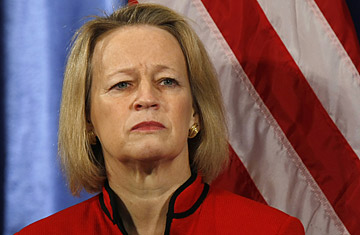
Mary Schapiro, Securities and Exchange Commission chief
Hoping to show she's got the right stuff, Mary L. Schapiro, 15 days on the job as chairwoman of the besieged Securities and Exchange Commission (SEC), took her first steps this week in shaking up the agency. She simultaneously secured an agreement with Bernard Madoff, worked on gaining tips about two more Ponzi schemes and waved goodbye to her chief enforcement officer, Linda Thomsen, who resigned.
Last weekend, reports began circulating of Thomsen's departure, just a few days after House Financial Services Committee members ripped her for failing to spot Madoff's alleged $50 billion Ponzi scheme and ignoring nine years of whistle-blower tips about the scam. (See pictures of the demise of Bernard Madoff.)
Not surprisingly, Thomsen's "dead man walking" status officially changed late Monday, when the SEC announced that its top cop had decided to call it quits and return to the private sector. Thomsen joined the agency in 1995 and became its enforcement chief in 2005.
No replacement for Thomsen was named, but experts agree that Schapiro needs a tough-as-nails enforcer to help remake the agency's image. The top mention to fill the spot is Robert Khuzami, a former federal prosecutor. He is currently a managing director and general counsel at Deutsche Bank. Khuzami spent 11 years at the U.S. Attorney's office in Manhattan, where he headed the white-collar crime unit, before taking a job at Deutsche Bank in 2002. The SEC declined to comment on a possible replacement for Thomsen; Khuzami's office did not comment either.
Although Khuzami is well respected by many, some people would like to see bolder personnel changes made in the SEC's enforcement operation. (See the worst business deals of 2008.)
"It's a problem that our regulatory agencies can't find tough prosecutors without ties to the banking industry," said John Coffee, an SEC watcher and a securities-industry law professor at Columbia University. "It's unsettling that the government's revolving door always leads back to banks." In any case, Coffee believes, Schapiro will "need more than one person to change things."
And while Thomsen's press-release drafts were still being proofed, the SEC announced on Monday that it had reached an agreement with Madoff over a partial judgment on civil penalties related to his alleged masterminding of the now infamous $50 billion Ponzi scheme, considered the largest in history. A Ponzi is a fraud in which money from new investors is used to pay off previous investors.
Madoff consented to the SEC without "admitting or denying the allegations" that he allegedly ran the decades-long fraud under the nose of the SEC. He accepted a permanent asset freeze and agreed that the SEC's complaints against him "are established" and cannot be contested, which makes it difficult for his lawyers to switch tactics and force a trial.
The agreement does not affect criminal charges against Madoff, once considered the smartest man on Wall Street, but it may signal a move on the criminal-plea bargaining front, according to Coffee. "This usually means the defense side is ready to give a little," he said.
While this was going on, SEC inspector-general David Kotz was huddled for several hours late last week with Madoff whistle-blower Harry Markopolos to learn about two new suspected frauds, or mini-Madoffs. Kotz is conducting an investigation into how the SEC missed the Madoff swindle for so long.
Markopolos, a private-securities fraud investigator, is the man the SEC ignored for nine years. The whistle-blower presented damning evidence against the SEC's handling of the Madoff case in a House Financial Services Committee hearing last week, where he detailed his unsuccessful quest to have the SEC stop Madoff's global Ponzi. Nevertheless, he said, he would deliver fresh evidence on two new cases to the SEC.
"We had a very productive meeting with Mr. Markopolos, and he presented to us two separate pieces of potentially improper activities," said Kotz. He would not comment on the nature of the information but said the evidence was given directly to Schapiro. There was no comment on what steps she or the agency might take next.
